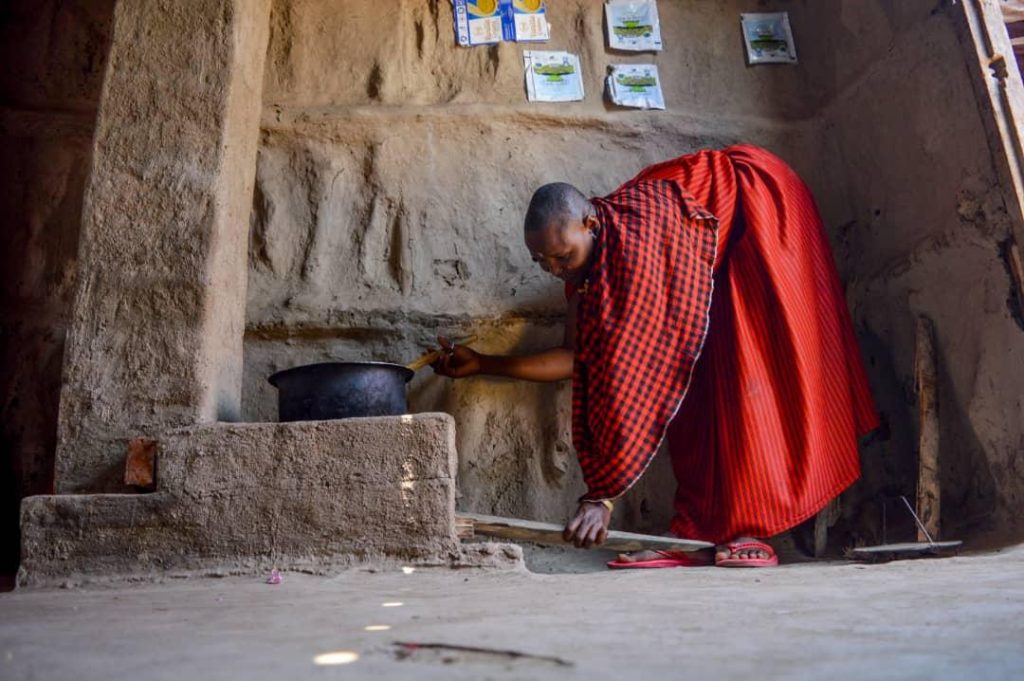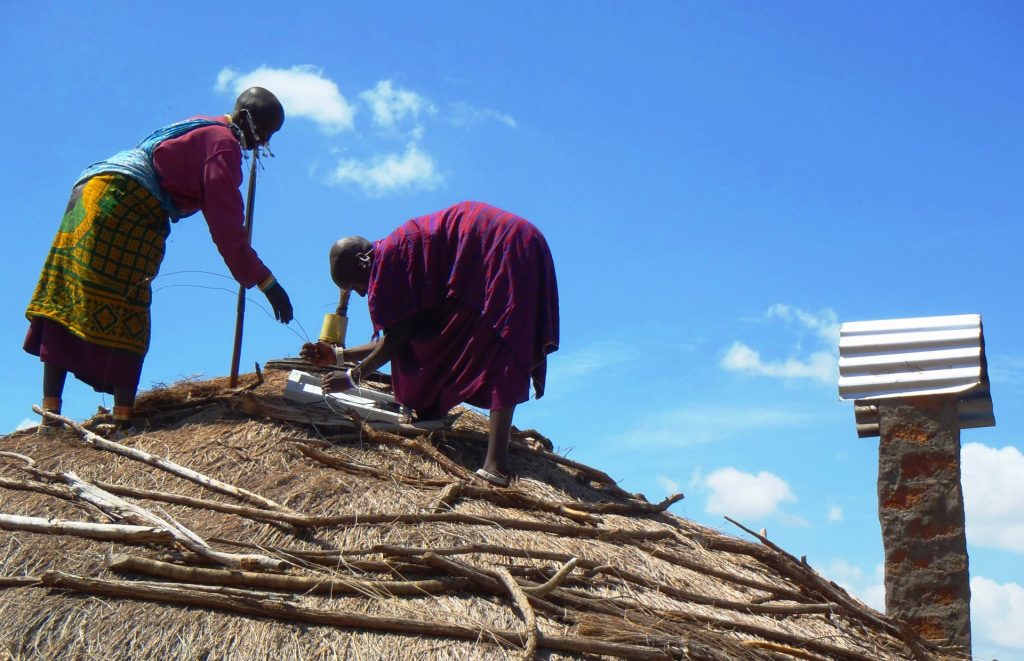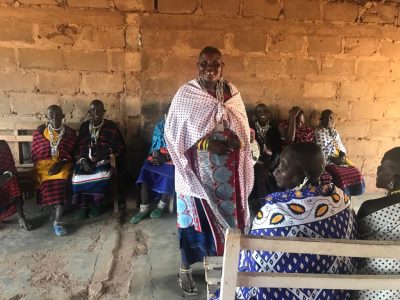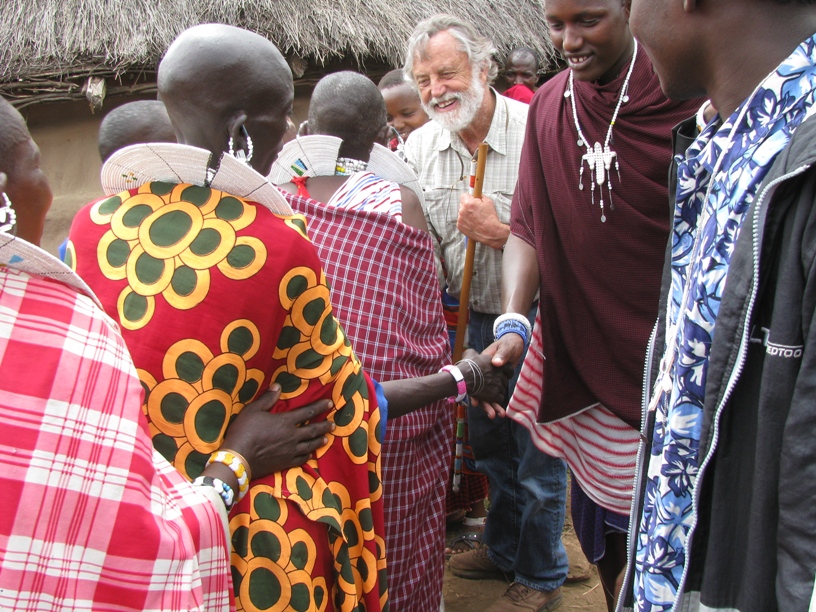Read about the International Collaborative

Audacious Action Africa
How a daring Maasai leader and an American physics professor organize to improve life in rural Africa
A 2024 presentation with Kisioki Moitiko, Project Manager, and Dr. Bob Lange, Founder of the International Collaborative for Science, Education, and the Environment (ICSEE)
The presentation includes stories from East Africa, describing their work with climate change adaptation, women’s empowerment, clean air and water, economic development, and reaching for a better life
 International Collaborative overview
International Collaborative overview
The possibility of genuine life improvement
Once people experience the joy of working together to make life better, they want to continue. The Maasai Stoves & Solar Project strives for the greatest possible direct impact from its multiple projects.
From the onset, with the introduction of smoke-removing efficient stoves, this has meant better health for women and their children. Because the focus goes beyond a single technological solution, the impact soon spreads and grows. The International Collaborative engages the people as they embrace the idea that problems can be solved through organizing for collective action.
Something new emerges in the midst of idea generation, engineering, design, and resource planning. Participants soon discover the greatest impact is on themselves, as a community. There is a new optimistic celebration of power and the realization of the possibility of genuine life improvement.
Now in the second decade of taking action, the International Collaborative encompasses these main areas of work:
- Chimney stoves for Maasai homes, reducing smoke, disease, and accidents
- Climate change adaptation in livestock management and agriculture
- Groundwater pumping with solar power for rain-independent irrigation
- Home improvement and transformed lives of women
- Organizing women’s groups in villages, building cooperative banks and individual and collective businesses
- Solar electricity for the home
- Water from polluted ponds made safe with chlorination
- Women’s direct organizing for financial and social strength
Maasai Stoves & Solar Project

The Maasai Stoves & Solar Project addresses the indoor smoke in the homes of pastoral people in East Africa caused by cooking on open wood-burning fires. This is a profound international health issue that affects millions in the developing world.
The Project designs and installs clean-burning and efficient wood-burning chimney stoves and solar panel-based electrical systems in the homes of the people. In addition, we install settlement-wide solar panel-based micro-grid electrical systems. We purchase and import components of the photo-voltaic systems but produce stoves locally.
Having a light at night is a dramatic lift from poverty. In Maasai homes a few watts make a difference in the quality of life. In the Maasai areas near the equator, dark nights are long year-round. In addition, cell phone charging in the home is cost-efficient, and keeps the phone safe and away from tampering
Stove installation impact on health and the environment
- 7100 stoves installed through 2024
- Each stove saves the woman of the house 10-12 hours of weekly wood-gathering labor
- Each stove saves 120 pounds of firewood per week, reducing deforestation
- The polluting particulate level from cooking smoke is reduced by 90 percent, alleviating chronic coughing and head congestion, primarily in women and children
- One stove reduces carbon dioxide emissions by 3.6 metric tons per year
- Carbon monoxide levels in the home are reduced by 90 percent, eliminating low-level poisoning
- The danger of burns to toddlers caused by open cooking fires in their homes is eliminated
- The smoke removal capacity of the stove helps save the 25 children per 1000 who would otherwise die of lung disease before the age of five
Maasai Stoves & Solar installation trainers and teams

The stove has a chimney and needs installation and is therefore an opportunity for employment. This is a special feature at the core of the impact of the Project. Team leaders train women in new villages to become installation experts. Both trainers and trainees earn money for this. The installers have organized themselves as the Monduli Pastoralist Women’s Organization (MPWO).
Maasai Stoves & Solar micro-grid electrification impact
From the beginning, the Maasai Stoves & Solar Project has integrated electrification on a home-by-home basis. The International Collaborative continues this approach on a significant scale. Since 2014 we have also brought shared electrification through micro-grids. The micro-grids supply power to all the homes and corrals of Maasai family settlements, or bomas. As of 2024, sixty-four bomas have micro-grid electrical service.
Safe water project impact

Water safety is essential to a good quality of life. Village health officials tell us that 35 children out of 1000 die before the age of five from waterborne disease.
The prevention of waterborne diseases lies in getting the pathogens out of the locally sourced water. The Maasai women bring water home to their families that they collect at rain-filled surface ponds. These ponds are seriously infected by E. coli and other pathogens.
Many villagers don’t realize how dangerous the water is for themselves and their children. Boiling is not an option because of the expense and extra firewood that would be needed.
- The International Collaborative prioritizes targeting the primary killers, including bacteria and other living organisms. All over the world, people access safe water through town or city chlorination programs. The International Collaborative now uses chlorination as a practical approach for these rural communities where women gather water.
- The International Collaborative completed and fully tested the water system pilot program in 2018 and continues to design systems adapted to each water source, and to the way the local women gather and use water.
- The water project in Mbuyuni now has four systems installed and managed by local collectives. Together, the four provide 20,000 liters a day of safe water for 500 families.
Chlorination system impact
- Forty liters of safe water a day provides a woman with drinking and bathing water for her family, without having to treat it herself. Women have a variety of ways to handle badly polluted water, from doing nothing to boiling it, at the cost of more energy and hours of extra work.
- Safe water is a crucial lifesaver. Without it, every year in these communities, 35 children per thousand under the age of five die of waterborne disease, with many more sickened.
- The installation of a 5,000-to 10,000-liter per day pond-side chlorination system costs only $35 per family. Maintenance costs a few cents per month per family.
- Each system is successfully managed within the community by an experienced leader
- System size is set to provide 40 liters per day for each family using that water source
- Costs are low and health impact significant and positive
Women’s empowerment overview
“We didn’t know we could do work like this, building the chimney and installing the firebox. We thought only men could.” -Paini Lorwasa, Eluwai, Tanzania

Because women embracing power is a central value for the International Collaborative, providing opportunities for women is key. Because of their chimney design, the International Collaborative stoves need expert installation. The Project had seen the need for installation as a potentially difficult logistical challenge to overcome. However, the Project leaders soon realized that the construction work required for chimneys and solar power presented great opportunities for women.
Joining the Maasai Stoves & Solar Installation Team provides the women income. In addition, as members, they join with the other stove installers across three districts in an active women’s organization. They collectively run a cornflour grinding mill in the area.
Maasai women who join stove installation teams are profoundly appreciative of the opportunity to learn to use tools and master construction and design challenges. They report feeling authentically empowered. Here are some results:
- More than 350 newly empowered installers have emerged, with more to follow
- Women installers initiated the self-directed Monduli Pastoralist Women’s Organization (MPWO)
- Installers receive electrical and building and management training
- Time and labor savings allow more women to start businesses and other enterprises
- There is greater appreciation of the power of the collective, versus what sole individuals can do
Women getting organized
“Women’s empowerment is not just a goal, but a means, a central element of methodology, and essential for success.”—Robert V. Lange
Women need social connection and independent income, especially in a polygamous
and patriarchal society, such as the Maasai’s. The Maasai Women’s Pastoral Organization is a group organized by the Maasai Women Stove Installation Team members themselves.
The International Collaborative organizes two additional types of women’s groups. One type is self-selecting based on family and social relationships but not marital status. The other kind includes widows. This means their husbands are dead, gone, or not contributing to child care and family needs.
These group operate cooperative banks and manage collective businesses. Together with the Global Fund for Widows, the International Collaborative organized 25 groups in seven villages. Each group of 25 women receives excellent training. The groups operate their own cooperative banks.
The International Collaborative’s Project Organizer, Mesha Singolyo, mindful of the goals of village leaders establishes the activities and gets the leaders’ support. Traditionally, men are in charge of livestock. But in every village with these groups there are men inspired by and supportive of the women’s organizations. The achievements of the groups impress them, and they join in as advisors. This occurs most frequently where the men can help to make the group’s livestock business a success.
The word has spread. Additional groups of women have begun to organize, sharing funds and collecting capital themselves. They come to us for training and to align with the International Collaborative. We invite them in, and provide a boost for their capital to the greatest extent our resources allow. As of 2024, the ICSEE has enabled more than twenty of these self-organized groups.
Climate change adaptation by example
“I’ve learned how to keep my cows healthy during the dry season and when there is no grass.”
—Mr. Olesereti of Baraka Village
Livestock
We are developing demonstration programs in livestock and agricultural areas to help the Maasai explore creative directions they can take in the face of the challenges to their rain-based economy.
The Maasai’s traditional herding practices have made them East Africa’s most famous pastoralists. But because of periods of serious drought in recent years, and the unpredictable weather in the changing climate, new approaches are essential.
Climate change is already here for rain-based livestock-based economies, affecting pastoralists in the plains of northern Tanzania. There will continue to be some seasons with plenty of rain and grass when traditional livestock practices will still function for the people. But it is important for the herders to be creative and open in order to manage livestock for economic and social survival and to keep pastoralists from having to moving to urban slums.
Established in 2017, the Project’s Manyara Feedlot is already having an impact, recognized by the Tanzanian government’s Uhuru Torch award that year. It provides a model of the flexibility required. It demonstrates how to care for cattle with purchased hay and food supplements when weather conditions require it. In addition, the International Collaborative Fodder Factory provides supplemental feed, essential during times of drought. Produced from nutritious agricultural waste, the fodder is low cost, yet very high quality.
The ICSEE Demonstration Hay Farm shows how grass can be grown in abundance, when weather conditions allow. It can then be cut, baled, and stored to be fed to cattle in feedlots when grazing is not possible due to drought.
Farming
Farming is also rain-dependent. In this area, even when there is good rain, there can be just one crop per year. But with rain starting and stopping without warning, even that one crop is uncertain.
In August 2023, the International Collaborative established a Demonstration Farm Project, or “Smart Farm.” In response to our growing awareness of the severe impact of climate change on rain-dependent farming, we purchased a six and a half-acre plot in Selela to plant different crops and crop combinations.
As with grazing, the problem is too widespread for the International Collaborative to bring a solution to each farmer; but again, we can create and demonstrate new ways to farm successfully in the face of climate change.
Together with neighboring farmers, we are exploring the feasibility of a greater use of groundwater. The ICSEE invested in drilling a borehole of sufficient depth to reach groundwater. Solar power drives the pumps, removing dependence on diesel fuel or the national electrical grid power.
This source is working well, allowing us to share the water with our neighbors, a key element of this commitment. We’ve raised and harvested multiple crops including tomatoes, corn, and bananas.
Joined by our neighboring farmers, we aim to investigate how practical and productive groundwater investment can be. We are exploring whether it can be an important element to maintain food production in the face of the changing weather.
Background information for the International Collaborative
The International Collaborative for Science, Education, and the Environment is comprised of the ICSEE Tanzania and the ICSEE. They are two legally independent, non-profit corporations. These organizations carry out the Maasai Stoves & Solar Project work with people of East Africa, primarily with the Maasai of Tanzania. The organizations are also known as the International Collaborative and the ICSEE(T) In Tanzania. The International Collaborative is dedicated to:
A better life for rural Africans and a cleaner environment for all
Maasai women who use the International Collaborative stove reduce indoor smoke by 90 percent. The Maasai Stoves & Solar Project has a powerful impact on health, economic well-being, women’s empowerment, climate change adaptation in this rural, rain-based economy, and the quality of life for the people.
The work of the International Collaborative spans traditional economic and social sectors. Core themes set the aims throughout. Every challenge, every problem requiring a collective effort is taken as an opportunity for organizing the people, and particularly the women.
The International Collaborative invites you to explore our work with climate change adaptation, clean cookstoves, clean water, improving health, local economic development, women’s changing roles, solar power, and more.
Originally established to enable fundraising for women of Zanzibar digging salt-free wells and starting businesses, ICSEE’s work with the Maasai of Tanzania began in 2009. In 2010 we established a registered Tanzanian non-profit corporation, allowing us to employ people and own property. In addition, we were then able to accept funds designated to go directly to an African organization.
Every project linked to reaching for a better life
- Earning and development must be linked. People cannot be required to take time away from earning to do good things for themselves and the community. Good work must be paid work
- There is constant expansion of opportunities for the people to be learners. Learning and building capacity must done through action. Simultaneously the people also act to improve life for themselves, their families, and their communities
- All International Collaborative work requires design and simple engineering, applying science, building successful structures, planning and financing. These are the elements of a new and genuine education for the people
The history of the ICSEE
In 1992 Dr. Robert V. Lange, physics professor and international science educator, founded the ICSEE. Its first programs helped to establish women’s businesses and clean water resources in remote Zanzibar villages. In 1986, his work in Tanzania began when he joined the faculty of the University of Dar es Salaam as a visiting physics professor.
Together with the department chair, Dr. Mohammed Bilal, he established the Zanzibar Science Camp, a science education project based on his expertise in U.S. elementary science education. It continued from 1988 to 1995.
In 2009, the founder of a secondary school in the Maasai village of Eluwai invited Dr. Lange for a visit. Dr. Lange was interested in indoor air pollution in Zanzibar, and the founder wanted him to see problems of health-threatening indoor smoke plaguing the homes of the Maasai people. Dr. Lange also observed the high consumption of wood fuel and the high burden on Maasai women of collecting firewood. Dr. Lange decided to focus on the indoor smoke challenge, and initiated the Stove & Solar Project of the ICSEE.
Dr. Lange met with the women and men of Eluwai to discuss working together, yielding an immediate enthusiastic response. The people were excited about the idea of removing smoke from the houses. The women hated the smoke, but had not realized that it could be changed. After seeing the solar panels and the lights at work, and hearing answers about safety from fire and electric shock, the people also embraced the solar work.
Learn more across our website.
 International Collaborative overview
International Collaborative overview

